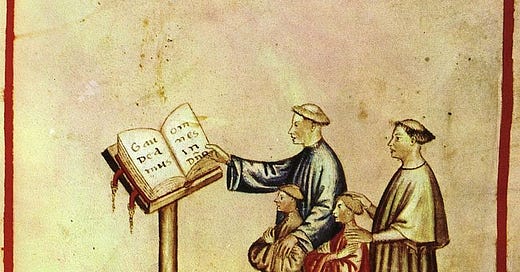Soul Music at Durham Cathedral
In a famous essay on the subject of goodness, the philosopher and novelist, Iris Murdoch (1919-99), wrote that ‘the enjoyment of art is a training in the love of virtue’.
She meant, I think, that good art inspires the imaginative leap of seeing our lives in the context of a wider vision and the consequent cultivation of attention to others, which are necessary for moral growth; Murdoch’s key question was, ‘How can we make ourselves better?’
The focus of Murdoch’s words was representational art but she also, just a few lines earlier in the same work, referred to the ‘spiritual role of music’. At Durham Cathedral—where I have been employed since 2019—we know that a great musical composition, like a beautiful painting, can exercise extraordinary power.
As Head of Development, I am often asked to ‘make the case’ for music as a priority for financial investment. The question usually goes something like this: Choral music may be central to the life of Durham Cathedral but how can it possibly compete with other eminently good causes as a priority for funding?
It is tempting to say, in reply, that music is part of our history (we have been ‘doing’ music for a long time), that we are preserving a great asset for future generations, and that plenty of research attests to the value of music for promoting positive mental and physical health. All of these responses would be valid—there is no need even to mention the alleged ‘Mozart effect’ on babies!—but perhaps a still more compelling reason is at hand.
Music is the Cathedral’s gift to and for the sake of the world, most clearly embodied in our community, visitors and all who ‘tune in’ to livestreamed services. Multiple times most weeks, entirely free of charge, our choir brings to life great works of art from across the centuries of human experience.
At a recent service of Evensong, for instance, Durham marked the 400th anniversary of the death of William Byrd (1540-1623) with a performance of several of his works. Byrd was an extraordinary person, a Catholic who nevertheless flourished in the court of a Protestant monarch, Elizabeth I (r. 1558-1603), at a time of acute suspicion between Christians. The performance of his works today, however, is no mere testimony to the man himself, frozen in historical time.
Choral music has the power to transport the heart of the listener away from the present world of its own self-absorption, creating conditions for empathy and compassion. The disorientation in time and space entailed by hearing Byrd’s early-modern compositions, necessitating a re-tuning of the ear, is a preparation for (and symbol of) a deeper disorientation, that of being transported from selfishness to loving attention to others.
Music can negate the narrow, earth-boundedness of our particular lives and open the soul to the wideness of heaven. Faith communities like Durham Cathedral intuitively grasp the conclusions of modern science, that singing and exposure to music exercise the brain and improve memory, since they entail a journey both into and with the historical past.
The case for music is, I think, primarily moral.
Great music has the potential to ‘make us better’, to return to Murdoch’s phrase, and in so doing contribute to the healthy functioning of society. Can you imagine a great civilisation without music? It is very difficult, if not impossible, to do so.
Music may offer no guaranteed protection against human wickedness, but surely a society without music would be missing a vital part of its social fabric, one of the very civilising influences making it worthy of the name.
Where there is life in its fullness and an abundance of virtue, there is music.
In a world properly orientated towards what really matters, the prophet Isaiah seemed to be saying, ‘the mountains and the hills . . . shall burst into song, and all the trees of the field shall clap their hands’ (Is. 55:12).1
An earlier version of this post was prepared as a contribution to the annual newsletter of Durham Cathedral Choir Association.



